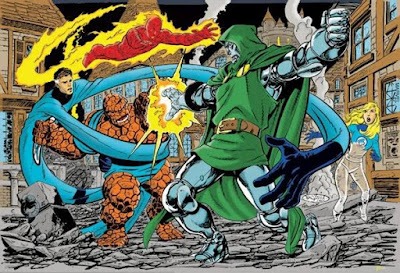To many Marvel fans, a faithful-to-the-source/live-action Fantastic Four has yet to be realized, though previous attempts have tried (and perhaps in the eyes of some, succeeded). The 1994 Roger Corman production certainly had its heart in the right place, but was buried from public view and is generally ridiculed by those who haven't even viewed it. Its existence was, in fact, a way to hold (legally) a spot for a big-budget remake, and from such we received the 2005 hit and its 2007 sequel, the latter including the Silver Surfer. A third chapter seemed inevitable, but as the years have passed, a decision to reboot surfaced.
Director Josh "Chronicle" Trank's "Fantastic Four" (or as its posters cleverly declare: "Fant4stic") takes Jack Kirby and Stan Lee's mythic team on a different, atmospheric trail. As Trank promised, his version feels more like Croenenberg-meets-Burton-meets-Spielberg than prior attempts. Therefore, this version is dark and sentimentally quirky, with a steady emphasis on its characters' metamorphoses, making it more in tune with any general "Fly" film than a typical superhero entry. That the characters' mutations project a foreboding, if not dangerous, feel also makes this version revisionist, even if its script (by Simon Kinberg, Jeremy Slater and Trank) remains traditional at its core.
Keeping with the mythology, our principles are back: the intellectual Reed Richards/Mr. Fantastic (Miles Teller); reckless Johnny Storm/Human Torch (Michael B. Jordan); focused Susan Storm/the Invisible Girl (Kate Mara); and stoic Ben Grimm/the Thing (Jamie Bell). The performers are younger than in movies past: wonder kids, for all intents and purposes, all under the guidance of Professor X-ish Franklin Storm (Reg E. Cathey). Though the youngsters are brilliant, they still project naivety and therefore, a sense of nervous awe at the events that affect them, making them more identifiable than if there were just bland eggheads. The youths' performances, which come across as credible and sincere, make the heroes identifiable, though loyalists will likely have preferred mature castings.
The principles are transformed through high-tech experimentation, which teleports them into a mystical, parallel dimension called the Negative Zone (otherwise called, Planet Zero), with one achieving physical distinction inadvertently at home base. Just as Captain America and the Red Skull reach their zeniths through a specialized source, the Negative Zone brings forth special traits otherwise concealed within each member. This includes the film's villain (an uneasy friend turned firm foe), Victor von Doom (Toby "Planet of the Apes" Kebbell), magnifying his innate mean streak to full-blown megalomania.
This process is, in essence, the cosmos' way of planting the seeds of good and bad and then allowing natural selection to resolve itself accordingly. This angle gives the new "Fantastic Four" a sense of organic growth, and as with the X-Men, the concept plays upon evolution, with good and bad "gods" stemming from out the process. How we "normal" folks exist (or not) among them is an insinuated concern and in turn, makes the Fantastic Four's fight against their iron-skinned foe ever more imperative.
Of course, none of us would expect damn Doom to emerge victorious, but the film's doleful blend makes us question such at times. We can't help but wonder, with the colorful frivolity of previous versions downplayed, how might the story achieve distinction and how far will it go in its attempt. Various scenes do create a pessimistic edge, giving an air of uncertainty as to whether our heroes possess enough preternatural fortitude to match their stellar reputations.
Still, other set-ups insinuate the characters' staunch tenacity, and as should only be the case, we're given obligatory examples to drive home the extent of their powers: Reed's elongation, Johnny's fiery bursts, Susan's transparency/shield force and Grimm's formidable form. Most impressive is the Thing, in this respect, the largest cinematic version of the character to date, and yes, the computerized rendering does work, which is saying a lot from one who favors the man-in-suit methodology. (Alas, it seems a tad disconcerting that our titan clobbers without his obligatory trunks.)
Along with the foursome's distinctions, a celebration of being different figures in (though in all fairness, previous versions also made excellent use of such). The fear of being freakish is conquered by the characters' acceptance and gratitude for their alterations. Its members realize that, what may seem like a curse to some is their exalted blessing. Through their "deformities", they can project a positive impact on reality, whether working with the government or as an independent entity.
The film's climax becomes a staggering, almost ethereal confrontation. However, like the 2005 and 2007 films, its scope feels more like a massive prelude than a stand-alone adventure. That's not to say it falls short of entertaining, but rather that it leans toward the future for culmination, rather than being the best self-contained tale it can be.
Thankfully, Trank's execution makes this "Fantastic Four" a contemplative piece. Unfortunately, it doesn't capture the jubilation of "Ultron" or "Ant-Man", but nor does it stumble into the looping excess of "Amazing Spider-man 2". The positive points may not be enough to placate die-hard Marvel fans, but if there's any reason to redo the mythology so soon after "Rise of the Silver Surfer", it only makes sense that its ambiance distinguish it. Only time (and of course, the fans) will decide whether the approach is worthy of continuation. A direct sequel has been promised, but poor box office can thwart that fairly fast.
It's clear, though, that this isn't the last we'll see of Marvel's first superhero team. Whether in life-action, animated or comic-book form, the Fantastic Four will inevitably return to fight the good fight. In that, we should all feel comforted.

















Looks as though Trank is disassociating himself (at least to some degree) from the production. That can't be a promising sign, but we'll see. Also, I wonder what inspired him to pull away from his "Star Wars" solo project. I'm most curious about that, indeed.
ReplyDelete